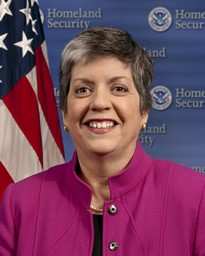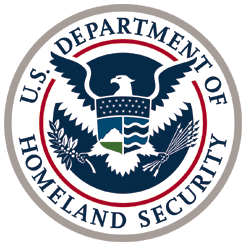Group Discussed Ways To Bolster International Aviation
Security
 DHS Secretary Janet Napolitano
(pictured, right) was in Tokyo last week, at the invitation of
the Japanese Ministry of Land, Infrastructure, Transport and
Tourism, for a meeting with top officials from the
Asia/Pacific region and the International Civil Aviation
Organization (ICAO) to discuss ways to bolster global aviation
security.
DHS Secretary Janet Napolitano
(pictured, right) was in Tokyo last week, at the invitation of
the Japanese Ministry of Land, Infrastructure, Transport and
Tourism, for a meeting with top officials from the
Asia/Pacific region and the International Civil Aviation
Organization (ICAO) to discuss ways to bolster global aviation
security.
“The attempted terrorist attack on Dec. 25 had global
ramifications—demonstrating the need for enhanced security
standards, information sharing and screening measures throughout
the international aviation system,” said Secretary
Napolitano. “Today’s (Friday's) meetings with partners
from nations throughout the Asia/Pacific region underscore our
commitment to working together to strengthen the ways we protect
the traveling public.”
In Tokyo, Secretary Napolitano stressed the need for
collaborative international action to prevent terrorists from
boarding commercial aircraft during meetings with ministers and
representatives from Australia, Burma, Cambodia, Canada, Hong Kong,
India, Indonesia, Japan, the Republic of Korea, Malaysia, Nepal,
New Zealand, Pakistan, the Philippines, Singapore, Thailand and
Vietnam—the third in a series of major international meetings
intended to build consensus on strengthening global aviation
security.
Secretary Napolitano underscored the vital importance of the
Asia/Pacific region as the world’s largest aviation
market—with approximately 647 million passengers traveling in
2009 alone—and emphasized the Obama administration’s
commitment to strengthening information sharing with international
partners about terrorists and other dangerous individuals who pose
a threat to the global aviation system.
 In 2010, the United States and New
Zealand signed an agreement strengthening security through
increased cooperation on science and technology. In 2008, DHS, the
Department of Justice, and the Department of State also worked
together to forge an agreement to prevent and combat crime with the
Republic of Korea by allowing for the exchange of biometric and
biographic data to bolster counterterrorism and law enforcement
efforts while ensuring privacy protections.
In 2010, the United States and New
Zealand signed an agreement strengthening security through
increased cooperation on science and technology. In 2008, DHS, the
Department of Justice, and the Department of State also worked
together to forge an agreement to prevent and combat crime with the
Republic of Korea by allowing for the exchange of biometric and
biographic data to bolster counterterrorism and law enforcement
efforts while ensuring privacy protections.
Following Friday's meetings, Secretary Napolitano and
participating officials issued a joint declaration on a way forward
to strengthen the international civil aviation system through
enhanced information collection and sharing, cooperation on
technological development, and modernized aviation security
standards.
While TSA does not conduct screening at foreign airports,
Secretary Napolitano is committed to strengthening coordination
with international partners to implement stronger and more
effective measures to protect the integrity of the global aviation
network. Friday's discussions in Tokyo build on recent
international meetings attended by Secretary Napolitano that have
also resulted in joint declarations to strengthen the international
civil aviation system between the United States and Argentina,
Brazil, Canada, Chile, the Dominican Republic, Mexico and Panama on
Feb. 17, and between the United States and the European Union on
Jan. 21.
Previously, Secretary Napolitano met with CEOs of member
airlines of the Air Transport Association of America (ATA), the
largest airline trade association in the United States, and the
International Air Transport Association (IATA), which represents
approximately 230 airlines and more than 90 percent of the world's
air traffic—building on previous meetings with domestic and
international private sector and ICAO leaders in Europe and
Washington since January—as part of her ongoing efforts to
bring together major domestic and foreign air carriers to work on
ways to bolster international aviation security.
 ANN's Daily Aero-Term (12.13.25): Light Gun
ANN's Daily Aero-Term (12.13.25): Light Gun Aero-News: Quote of the Day (12.13.25)
Aero-News: Quote of the Day (12.13.25) NTSB Final Report: Gippsland GA-8
NTSB Final Report: Gippsland GA-8 Classic Aero-TV: Historically Unique -- Marlin Horst's Exquisite Fairchild 71
Classic Aero-TV: Historically Unique -- Marlin Horst's Exquisite Fairchild 71 Airborne 12.12.25: Global 8000, Korea Pilot Honors, AV-30 Update
Airborne 12.12.25: Global 8000, Korea Pilot Honors, AV-30 Update




